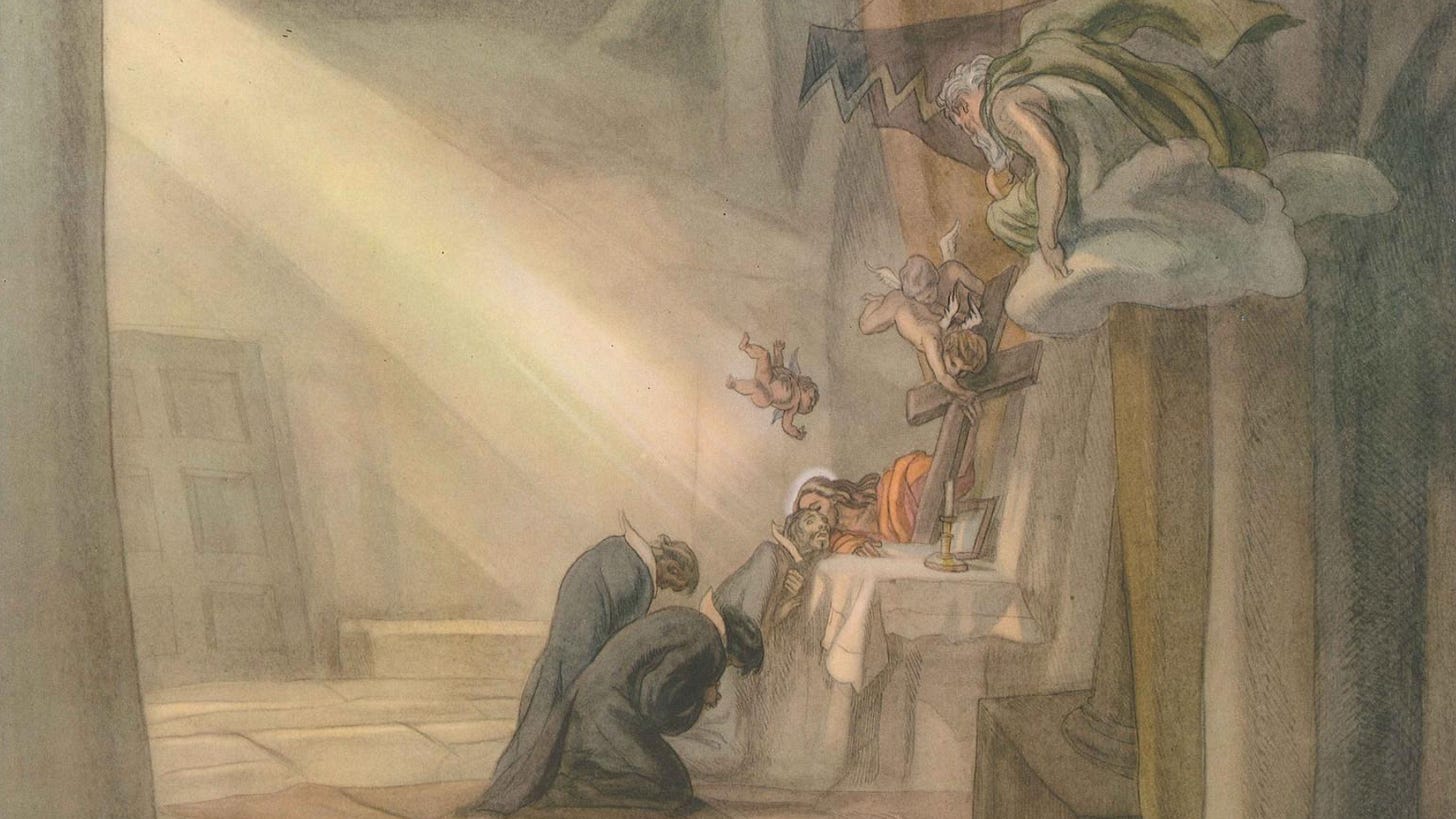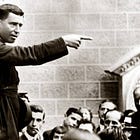‘Providential weapon' which must not be lost—Pius XII on the Spiritual Exercises
Pius XII affirmed the 'Work' of Fr Vallet, and called for the Ignatian Exercises to be offered in every parish in the world.

On a second occasion, Pius XII affirmed the Work of Fr Vallet, and called for the Ignatian Exercises to be offered in every parish in the world.
Editors’ Notes
Less than a decade after praising the Ignatian Exercises as a proven path to holiness, Pope Pius XII warned against their dilution. Addressing Fr. Vallet’s Diocesan Work of Parish Exercises of Barcelona, he insisted that the Exercises were not relics of the past or exclusive to clergy, but a proven weapon for all Catholics.
His audience—heirs of a movement that had fortified thousands of martyrs in the Spanish Civil War—stood as living proof of their power.
Today, many ‘traditionalists’ rightly decry the Jesuits’ collapse, but neglect the militant spirituality of their founder—even subjecting him to accusations of rationalism and individualism. In the place of the structured battle plan of the Exercises, they advocate meditations on Tarot Cards, falling asleep at shrines, and “theurgic magic.”
Against such lovers of novelty—even under the cover of antiquarianism—Pius XII insisted that holiness is found in ordering one’s life, overcoming oneself, and embracing true discipline. The Church’s weakness today stems from abandoning the very means that once made her strong.
His message remains urgent: return to St Ignatius and reclaim the spiritual exercises that formed the saints and strengthened martyrs.
Discourse to a group from ‘The Diocesan Work of Parish Exercises of Barcelona’
Pope Pius XII
Friday, 15 June 1956.
Growth and value of the Parish Exercises
It is not yet ten years, most beloved children, since the fourth centenary of the pontifical approval of the Book of the Exercises of St Ignatius of Loyola, coinciding with the silver jubilee of your Diocesan Work of Parish Exercises of Barcelona, provided us with the joyful occasion to receive you in this house of the common Father; to bless you and to express in a few words the satisfaction we felt for the beautiful apostolic work that your organisation was carrying out, exhorting you always to go forward on the path of fidelity to Ignatian ideas and methods, as a guarantee of vitality and efficacy.1
Since then, just as your number has grown and the field of your work has expanded, so might we increase and extend our praise, as we would do with the greatest pleasure, were it not that your presence suggests to us an idea that we wish to set forth plainly, as a Father who gently converses with children whom he knows love him dearly.
The Exercises: A weapon for holiness for all
For indeed, that the Spiritual Exercises of St Ignatius of Loyola are a providential weapon, overflowing with heavenly wisdom, which in four centuries has yielded inestimable fruits of holiness, is a matter that hardly seems necessary to repeat. Yet in the practice of the Exercises—especially in that withdrawal, in that complete consecration, in the loftiness of the goals proposed, and, in general, in all the conditions they require, which serve so greatly when faithfully observed—there is such a set of demands that they might appear to be something reserved for those already withdrawn from the clamour of the world, or at the very least as a practice exclusive to certain especially select groups, and thus less numerous and widespread, thereby restricting their field of action.
Nothing could be more false, most beloved children, as your presence here clearly demonstrates, especially when we consider you as a worthy representation of the tens of thousands of souls who have benefited from the practice of the Exercises through your Work.
The Exercises adapt to all, bearing fruits in every life
We would readily concede that the fruit will not be the same in one who undertakes, for example, the full month—which, to our great consolation, we see becoming ever more widespread—or in one who, out of necessity, must limit himself to the classical cycle of eight, five, or even fewer days, within that infinite range of possibilities to which the Ignatian method lends itself. In like manner, we could concede that the same purpose is not sought when the Exercises are given to children or young people, as when they are given, for instance, to those who seek to discern their future state of life or who are in need of a radical reform of life.
But what we affirm without hesitation is that always, in every case, and for all persons, there will be a participation in that fruit which consists in “ordering one’s life”2 after “overcoming oneself”,3 removing “all disordered affections [...] to seek and find the divine will in the disposition of one’s life”.4 Always one will emerge from them with a greater practice of prayer and examination of conscience, with a greater desire for mortification, with a deeper moral formation; always the exercitant will afterwards feel himself more disposed “in all things to love and serve His Divine Majesty”.5 Always, in short, whoever has well undertaken a retreat of Exercises will feel impelled to take a great step forward on the path of Christian perfection, towards that goal which is closed to no one and in which each one may take a different place according to the way in which he feels himself able to respond to that calling so admirably described by the Saint himself.6
A call for the universal expansion of the Exercises
Your Work, precisely because it is parochial, proclaims that such a good is exclusive to no one; your Work, with the abundant fruits harvested over its not brief existence, declares what may be achieved in so vast a field; your Work, precisely in this Ignatian centenary, must be recognised as a stimulus for all who long to labour in the diffusion of the practice of the Spiritual Exercises among all social classes, among all kinds of persons, and in a very special way in that cell of Christian life which is the parish.
Would that we might soon see it employed in all the parishes of Christendom, to sustain and increase the Christian life of the faithful, and to make it flourish anew where it may have declined and languished. Our times call for methods that are at once agile and rational, attractive and profound, universal and personal; methods in which no element remains unused, no problem unresolved, no longing unsatisfied; methods endorsed by the experience of centuries, yet with sufficient flexibility to be adapted to modern demands. Precisely for this reason, as we have repeatedly declared, the Spiritual Exercises of St Ignatius of Loyola still have today a word to say, a word of which the world must by no means deprive itself.
Final blessing and Apostolic charge
Go forth, then, most beloved children, and kneel before the tomb of him whose name is inseparably linked to the Spiritual Exercises, and implore his powerful intercession before the throne of the Most High, that your Work may continue to grow in number, fervour, and apostolic efficacy. There, renew your apostolic resolutions. But above all, assure him that it is your deliberate intention “to devote and consecrate yourselves in every service of (your) eternal King and universal Lord”,7 recognising “so many blessings received, (that you may) in all things love and serve His Divine Majesty”.8
Many thanks, most beloved children, for your gifts: the generosity of the children enlarges the possibilities of the Father’s charity and makes them partakers in it, with a blessed exchange of gifts and spiritual graces.
May the blessing of Almighty God, Father, Son, and Holy Ghost—that most august Trinity to whom the Patriarch of Loyola daily entrusted himself in Manresa—accompany you, as we implore on your behalf. May it render your Work fruitful in abundant fruits of holiness, as we desire. A special blessing also for your most beloved Prelate here present, for the priests who labour in this Work, for your families and friends, for your intentions and desires, and for all that at this moment you wish to see blessed.
Discorsi e Radiomessaggi, vol. XVIII, pp. 287-289.
Read Next:
HELP KEEP THE WM REVIEW ONLINE WITH WM+!
As we expand The WM Review we would like to keep providing free articles for everyone.
Our work takes a lot of time and effort to produce. If you have benefitted from it please do consider supporting us financially.
A subscription gets you access to our exclusive WM+ material, and helps ensure that we can keep writing and sharing free material for all.
(We make our WM+ material freely available to clergy, priests and seminarians upon request. Please subscribe and reply to the email if this applies to you.)
Subscribe to WM+ now to make sure you always receive our material. Thank you!
Follow on Twitter, YouTube and Telegram:
Fair Use Rationale for image above: It is historically significant; it is being used for informational and educational purposes; it is readily available on the internet (e.g., Twitter); it (and others from the same collection) is used by many other sites; it is a low resolution copy of the original; it is unsuitable for commercial use.
Cf. Discorsi e Radiomessaggi, vol. X, p. 261-262.
Exerc. Spirit., 21.
Ibid.
Ibid. 1.
Ibid. 233.
Cf. Exerc. Spirit. 91-100.
Ibid., 97.
Ibid., 233.








